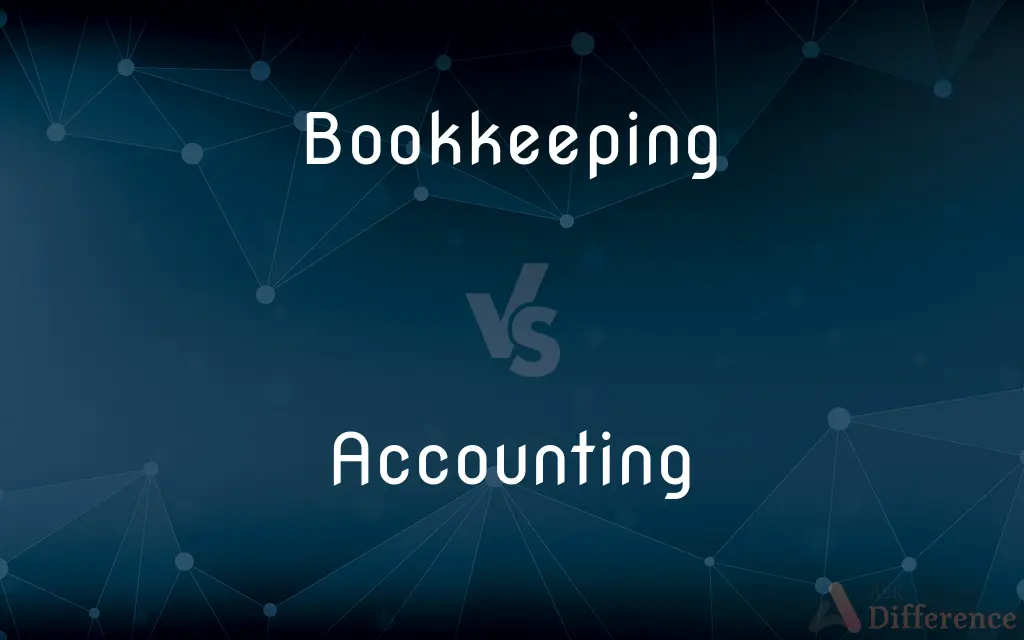Bookkeeping vs. Accounting — What's the Difference?
By Tayyaba Rehman — Updated on September 20, 2023
Bookkeeping involves the day-to-day recording of financial transactions like sales, purchases, and payments. Accounting is a broader field that interprets, analyzes, and presents financial information, often utilizing bookkeeping data.

Difference Between Bookkeeping and Accounting
Table of Contents
ADVERTISEMENT
Key Differences
Bookkeeping is the process of systematically recording daily financial transactions of a business. This is a foundational practice that makes it possible for businesses to track their financial status. Accounting, however, goes beyond just recording; it involves summarizing, interpreting, and communicating the financial data in useful ways.
Bookkeeping focuses on the "what"—what transactions occurred. Tasks include recording sales, tracking expenses, and balancing ledgers. Accounting, on the other hand, focuses on the "why" and "how"—why a certain financial pattern might be occurring and how it could impact the business. Accountants often create financial reports and perform audits.
Bookkeeping is generally considered to be a subset of accounting. It is the necessary first step in the accounting process. Without accurate bookkeeping, accounting's role in making business decisions based on financial data would be compromised. Accountants take the data from bookkeeping to create financial models.
Bookkeeping typically does not require specialized education beyond understanding basic accounting principles. In contrast, accounting often requires formal education and certification, as accountants need to understand laws and regulations, taxation, and more complex financial operations.
Comparison Chart
Purpose
Record financial transactions
Interpret and analyze financial data
ADVERTISEMENT
Education
Basic accounting skills
Often requires formal education
Tasks
Record sales, track expenses
Financial reporting, auditing
Level of Complexity
Relatively simple
More complex
Relation
Subset of accounting
Broader field
Compare with Definitions
Bookkeeping
Management of ledgers and financial documentation.
Bookkeeping involves balancing ledgers and maintaining financial files.
Accounting
The broader practice encompassing bookkeeping.
Accounting includes bookkeeping, auditing, and financial reporting.
Bookkeeping
Day-to-day financial record-keeping.
Bookkeeping includes the daily recording of sales and expenses.
Accounting
The process of analyzing financial data.
Accounting helps businesses make informed decisions.
Bookkeeping
The practice of recording financial transactions.
Bookkeeping ensures that all transactions are accurately recorded.
Accounting
The interpretation and communication of financial information.
Accounting translates financial data into actionable insights.
Bookkeeping
The systematic tracking of a company's financial activities.
Proper bookkeeping is essential for a healthy business.
Accounting
Often requires formal education and certification.
Accounting professionals usually hold degrees and certifications.
Bookkeeping
An essential part of the accounting process.
Bookkeeping provides the raw data needed for accounting.
Accounting
Accounting or accountancy is the measurement, processing, and communication of financial and non financial information about economic entities such as businesses and corporations. Accounting, which has been called the "language of business", measures the results of an organization's economic activities and conveys this information to a variety of users, including investors, creditors, management, and regulators.
Bookkeeping
Bookkeeping is the recording of financial transactions, and is part of the process of accounting in business and other organizations. It involves preparing source documents for all transactions, operations, and other events of a business.
Accounting
The practice or profession of maintaining the financial records of a business, including bookkeeping as well as the preparation of statements concerning the assets, liabilities, and operating results.
Bookkeeping
The practice or profession of recording the accounts and transactions of a business.
Accounting
Present participle of account
Bookkeeping
(accounting) The skill or practice of keeping books or systematic records of financial transactions, e.g. income and expenses.
Accounting
(business) The development and use of a system for recording and analyzing the financial transactions and financial status of an individual or a business.
Bookkeeping
(computing) General tasks for maintaining a system.
Accounting
A relaying of events; justification of actions.
He was required to give a thorough accounting of his time.
Bookkeeping
Present participle of bookkeep
Accounting
(law) An equitable remedy requiring wrongfully obtained profits to be distributed to those who deserve them.
Bookkeeping
The art of recording pecuniary or business transactions in a regular and systematic manner, so as to show their relation to each other, and the state of the business in which they occur; the art of keeping accounts. The books commonly used are a daybook, cashbook, journal, and ledger. See Daybook, Cashbook, Journal, and Ledger.
Accounting
A convincing explanation that reveals basic causes;
He was unable to give a clear accounting for his actions
Bookkeeping
The activity of recording business transactions
Accounting
A system that provides quantitative information about finances
Accounting
The occupation of maintaining and auditing records and preparing financial reports for a business
Accounting
A bookkeeper's chronological list of related debits and credits of a business; forms part of a ledger of accounts
Accounting
A statement of recent transactions and the resulting balance;
They send me an accounting every month
Accounting
Involves creating financial statements and reports.
Accounting is responsible for producing income statements and balance sheets.
Common Curiosities
What are the main tasks of Bookkeeping?
Recording sales, tracking expenses, and balancing ledgers are main tasks.
What is Bookkeeping?
Bookkeeping is the practice of recording daily financial transactions.
Do you need a degree for Accounting?
Most accounting roles require formal education and often certification.
Is Bookkeeping the same as Accounting?
No, bookkeeping is a subset of accounting focused on recording transactions.
What are the main tasks of Accounting?
Financial reporting, analysis, and auditing are primary accounting tasks.
What does Accounting analyze?
Accounting analyzes financial patterns, performs audits, and creates reports.
Is Bookkeeping necessary for Accounting?
Yes, bookkeeping provides the essential data that accounting relies upon.
Who performs Accounting?
Certified Public Accountants (CPAs) and accounting firms often perform accounting.
Can software replace Accounting?
Accounting software can aid in tasks but cannot replace human analysis and interpretation.
What is Accounting?
Accounting is the analysis, interpretation, and presentation of financial data.
Who performs Bookkeeping?
Bookkeepers or accounting clerks usually perform bookkeeping.
Do you need a degree for Bookkeeping?
Generally, a basic understanding of accounting principles suffices for bookkeeping.
Is Bookkeeping easier than Accounting?
Bookkeeping is generally less complex and focuses on daily transactions.
What are the end products of Accounting?
Financial statements, audit reports, and financial analyses are end products of accounting.
Can software replace Bookkeeping?
Software can assist but usually cannot fully replace human oversight in bookkeeping.
Share Your Discovery

Previous Comparison
Tone vs. Mood
Next Comparison
Strull vs. KrumkakeAuthor Spotlight
Written by
Tayyaba RehmanTayyaba Rehman is a distinguished writer, currently serving as a primary contributor to askdifference.com. As a researcher in semantics and etymology, Tayyaba's passion for the complexity of languages and their distinctions has found a perfect home on the platform. Tayyaba delves into the intricacies of language, distinguishing between commonly confused words and phrases, thereby providing clarity for readers worldwide.














































